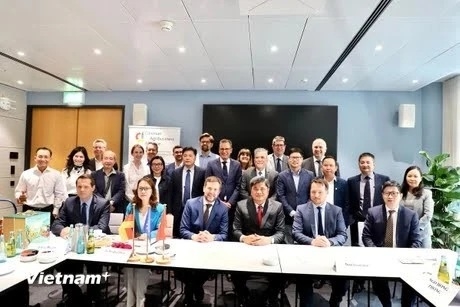During the trip, the delegation held working sessions with several key German institutions, including the Federal Ministry of Food and Agriculture (BMEL), the Federal Ministry for Economic Cooperation and Development (BMZ), the German Agribusiness Alliance (GAA), the German Agricultural Society (DLG), the President of the Thuringia State Parliament, the Minister of Labor and Social Affairs, as well as other ministries and agencies involved in the field of agriculture.
    |
 |
|
Deputy Minister Tran Thanh Nam (front line, in a red tie) takes a photo with representatives of German associations and businesses at the event. (Photo: Vietnam+) |
A major highlight of the visit was a trade promotion forum on Vietnam - Germany agro-forestry-aquatic products, which attracted participation from various trade associations, vocational training institutions, German distribution channels, supermarket chains, and nearly 50 companies specializing in the production, processing, and logistics of agricultural, forestry, and aquatic products.
At the forum, Vietnamese and German associations and businesses actively exchanged insights on market demands, consumer preferences, and import-export regulations. They also shared experience in exporting fruits, agricultural goods, seafood, and meat products to German supermarket chains. Participants called for closer cooperation between government agencies to facilitate market access and enhance agricultural collaboration, particularly for priority products that meet both countries' market needs.
In his remarks at the event, Deputy Minister Nam highlighted the economic and agricultural trade achievements of both countries. He emphasized the significant potential for cooperation in food safety across the production chain, vocational training linked with practical application, as well as digital transformation and mechanization in agriculture.
He proposed that German associations should organize annual activities to connect German and Vietnamese businesses, promoting and expanding markets for German products. Vietnamese associations and enterprises, in turn, should collaborate with their German counterparts to participate in trade promotion events such as fairs, exhibitions, and market research initiatives to enhance Vietnam’s agricultural exports.
Nam also stressed the need for agricultural associations in both countries to establish partnerships and form supply chain-based business groups. This would ensure compliance with value chain standards, reduce logistics costs, and maintain product quality from production to consumption, he stated.
Additionally, he encouraged Vietnamese enterprises to form joint ventures with German companies in production and processing to meet regulatory requirements and consumer preferences. This would facilitate exports through German distribution networks and reach the Vietnamese business community in Germany.
Vietnamese Ambassador Vu Quang Minh emphasized the importance of the event, particularly in the context of global challenges disrupting trade and economic cooperation. He underlined the need to strengthen bilateral relations, especially in agriculture, fisheries, and environmental sectors — areas of strategic importance to both nations.
He noted that the complementary nature of Vietnam’s and Germany’s economies presents a significant advantage for boosting bilateral trade, enabling both sides to leverage their respective market strengths and improve resilience in the face of global economic uncertainties.
Dr. Per Brodersen, Director of the GAA, stated that German - Vietnamese agricultural cooperation is entering a new phase, offering vast potential in productivity, efficiency, exports, and value addition. He noted that the working session between the MAE and BMEL has opened up many new opportunities for collaboration, especially in the agri-food sector
While there, the delegation also held additional working sessions in Erfurt (Thuringia state) and Frankfurt (Hessen state), engaging with various agencies focused on agricultural cooperation and vocational training. Notably, the MAE signed six Memorandums of Understanding (MoUs) with the Erfurt Vocational Education and Training Centre in Thuringia.
Source: VNA